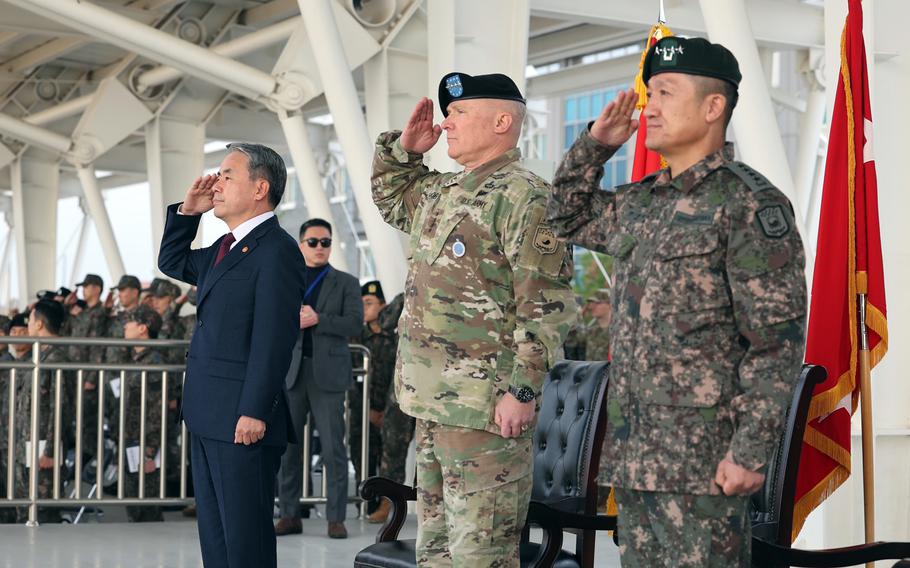
South Korean Defense Minister Lee Jong-sup, left, U.S. Forces Korea commander Gen. Paul LaCamera, center, and South Korean Gen. Ahn Byung-seok attend the opening ceremony of the Combined Forces Command headquarters at Camp Humphreys, South Korea, Nov. 15, 2022. (South Korea Ministry of National Defense)
CAMP HUMPHREYS, South Korea — South Korea’s Ministry of National Defense revealed in a study released Thursday new details of North Korea’s strengthened armed forces.
The biennial defense report is the first published under South Korean President Yoon Suk Yeol’s administration. It describes North Korea as an “enemy” and an ongoing national security threat.
North Korea's Workers' Party during a plenary meeting in December described the South as the “evident enemy,” the ministry said in its report.
“Thus, the North Korean regime and military, which is the principal agent of the performance, is our enemy,” the ministry report states.
Around 70% of North Korea’s army, 60% of its navy and 40% of its combat aircraft are deployed south of the Pyongyang-Wonsan Line — a strategic line in the southern half of the country stretching from the capital city in the west to the port city in the east, according to the ministry’s report.
The North is capable of “surprise attacks at any time,” according to the ministry.
The ministry estimated that North Korea has 4,300 tanks, 2,600 armored vehicles, 8,800 artillery systems and 5,500 multiple launch rocket systems. In addition to upgrading its deteriorating and outdated assets, the North’s army recently began increasing the caliber of its rockets from 240 mm to 300 mm, according to the ministry.
“North Korea has been consistently developing nuclear weapons, ballistic missiles and chemical and biological weapons in order to strengthen its capabilities for strategic attacks,” the report said. It added that the regime led by Kim Jong Un is believed “to have reached a significant level in the miniaturization of nuclear weapons” and possessed over 154 pounds of plutonium, an increase of 44 pounds from 2020.
North Korea conducted its last ballistic missile test on Jan. 1. It fired around 75 missiles in 36 separate days of testing in 2022, an annual record, and is believed by U.S. and South Korean intelligence agencies to have fully prepared to conduct its seventh nuclear test.
Despite the threats posed by North Korea, the South’s military will continue to “open the dialogue door” and pursue inter-Korean relations “based on principles and reciprocity,” the report states.
Yoon in August offered North Korea economic and medical incentives if it took steps toward denuclearization.
Seoul and Washington have also boosted their alliance with upscaled joint military drills throughout the year and by developing a "faster and more sophisticated alliance response" to Pyongyang's missiles, according to the report.
On Friday, the National Defense Ministry announced it would participate in a tabletop exercise focusing on North Korea’s nuclear threat Wednesday at the Pentagon. In addition, a South Korean military delegation is scheduled Thursday to visit Naval Submarine Base Kings Bay in Georgia.
North Korea’s Foreign Ministry described the U.S.-South Korean drills as a “worrying military demonstration” that “seriously encroach upon the security interests of [North Korea],” according to a statement in the state-run Korean Central News Agency on Thursday.
“In case the U.S. and South Korea carry into practice their already-announced plan for military drills which [North Korea] … regards as preparations for an aggression war, they will face unprecedentedly persistent and strong counteractions,” the statement said.
Stars and Stripes reporter Yoo Kyong Chang contributed to this report.